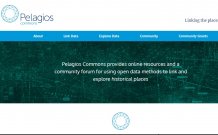Articles

New funding to extend the Pelagios project
University of Exeter receives funding for the Pelagios project to connect online cultural heritage
The University of Exeter has secured new funding to extend the Pelagios project, an international consortium that helps to make primary sources more accessible for historians, classicists, archaeologists and the general public.
Pelagios will use $750,000 from The Andrew W. Mellon Foundation to extend work to connect historical resources available on the internet related to the same geographical location or topic. The funding will ensure this method of linking information can be used to support university teaching and help galleries, archives and museums to show connections.
There will be new workshops and seminars for university lecturers, and ready-made teaching packs with tutorials, lesson plans and exemplar materials.
In the words of Project Director Leif Isaksen, Professor of Digital Humanities at the University of Exeter, “Evidence about the past is fragmentary, and historians and other academics are always looking for ways to join the pieces together. Linking sources in this way helps them to do this, by allowing them to associate different sources with a specific place or concept.”
Pelagios's team of international researchers have already developed two software services to support the integration and analysis of historical resources. Recogito is a Web-based service for the collaborative annotation of historical documents with place references and spatial coordinates, while Peripleo is a map-based search engine for exploring inter-linked collections. Together they allow academic researchers to describe the contents of historical sources, compare them to other collections, and see their relevance to a particular location.
According to Pelagios Collections Director Rebecca Kahn, of the Berlin-based Alexander von Humboldt Institute for Internet and Society, “Museums, archives and libraries always benefit from showing show how their collections relate to material elsewhere and the new funding will allow us to achieve this at scale”.
Pelagios Education Director Valeria Vitale of the Institute of Classical Studies, London, added: “New course materials and training opportunities developed by the project will allow educators across the humanities to include digital engagement with primary documents as part of their curriculum.”
The Pelagios 7 project runs for two years until December 2019. Its Investigative Team comprises Leif Isaksen, (University of Exeter), Elton Barker (Open University), Rebecca Kahn (Alexander von Humboldt Institute for Internet and Society), Rainer Simon, (AIT Austrian Institute of Technology) and Valeria Vitale, (Institute of Classical Studies) For further details, please visit the Pelagios Commons website: commons.pelagios.org or email the Investigative Team: commons@pelagios.org.
Date: 2 March 2018
